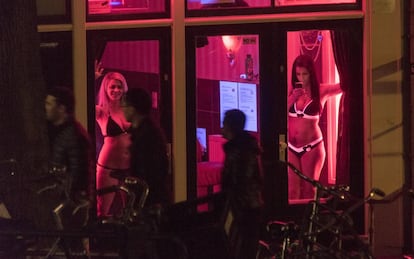How a brothel in Amsterdam empowers sex workers
My Red Light wants to help transform prostitution, when exercised voluntarily, into a normal profession


Prostitution has been legal in the Netherlands since 2000, but sex workers, who pay taxes and must register with the chamber of commerce as self-employed, can’t get someone to sell them a house. Banks also don’t want to issue credit cards in their name for professional uses, only personal, because it’s a risky and stigmatized job.
Almost two decades later, the law still hasn’t normalized sex work, so My Red Light, the first brothel run by prostitutes, wants to help change things. It has been open for three months in the red light district of Amsterdam and uses 13 of its 14 windows for displays that have made the district famous. That’s at night. During the day, when there are more tourists than clients, they only use three or four.
Local government greenlighted the project, but it is not a municipal brothel and does not receive subsidies
“It will take time, but we hope that the project, which is unprecedented in the world, will serve to emancipate and empower women (also transsexuals and men) who work voluntarily,” says Justine le Clercq, a spokeswoman for My Red Light.
An artist and a writer, Justine, 50, ended up on the streets between the ages of 18 and 21 because of drugs, and she speaks passionately about My Red Light. It aims to create, she says, “a community where sex workers (of which there are about 40) feel secure in being part of the leadership.” The brothel is distributed between four buildings owned by the City Council, which later sold them to a foundation. “It’s not a municipal brothel. The rent is paid for with the prostitutes’ income,” she says. “This needs to be clarified. We do not receive subsidies, although we do compete with the 10 other brothels in Amsterdam.”
The government “greenlighted the project after closing some 125 windows in the area and now it watches its evolution, and nothing more,” adds Jasper Karmen, a spokesman for the mayor. Lyle Muns, a sex worker and member of the board of My Red Light, emphasizes in an email the “talent, innovation, and creativity that the sector offers. Many people think of exploitation, sexual abuse and drug addiction when talking about sex work, but projects like this show that sex workers are much more than that.”
Decorated to their taste
Decorated in red and black tones by the interior designer Janpaul Scholtmeijer of the Vens architecture studio, with furniture from the Lensvelt firm, the workers dictated their preferences for the space, highlighting strict hygiene standards. Instead of floor tiles, like the other brothels use, they installed linoleum, which is warmer. To avoid any tension, My Red Light pays the same fee for the windows as the rest: €80 from 10am to 8pm, and €160 from 8pm to 5am. The minimum fee charged the customer is usually €50 for half an hour.
I realize that is it difficult to understand someone choosing this profession, but not all sex workers are victims Justine le Clercq, My Red Light spokeswoman
“Form there, there are no limits,” says Justine, who prides herself on differentiating voluntary prostitution from sex trafficking, a “horrendous crime.” “I understand that is it difficult to understand someone choosing this profession,” she continues. “But not all prostitutes are victims, or victims of trafficking. In the Netherlands there is more human trafficking in the flower industry, greenhouses, or construction. I’m sure that in the Red Light district there is no more. The problem is that they can’t stand up to defend themselves, but we will continue to make the difference.”
But this enthusiastic view is subject to nuance. Jolanda de Boer, a prosecutor specializing in people trafficking, says that My Red Light is “a good idea” but that there is also trafficking going on in Amsterdam’s red light district.
“It is hard to find the places, and no matter how many laws we pass, it’s just so easy to bring a girl over from Eastern Europe and put her in a window display against her will the moment she arrives...” she notes.
De Boer admits that the reality of women who are prostitutes of their own free will “is not my field of expertise,” but she believes that these represent a minority, and she worries about prostitution being considered a normal job.
“There is no school of prostitution, and kids don’t go around saying that they want to be prostitutes when they grow up,” she says. “It’s respectable, but I think that calling it a normal job is an insult to many women, who may not be reporting their own situation. Controls are necessary, otherwise it is the traffickers who win out. And that’s when we really start talking about victims.”
English version by Debora Almeida.
Tu suscripción se está usando en otro dispositivo
¿Quieres añadir otro usuario a tu suscripción?
Si continúas leyendo en este dispositivo, no se podrá leer en el otro.
FlechaTu suscripción se está usando en otro dispositivo y solo puedes acceder a EL PAÍS desde un dispositivo a la vez.
Si quieres compartir tu cuenta, cambia tu suscripción a la modalidad Premium, así podrás añadir otro usuario. Cada uno accederá con su propia cuenta de email, lo que os permitirá personalizar vuestra experiencia en EL PAÍS.
¿Tienes una suscripción de empresa? Accede aquí para contratar más cuentas.
En el caso de no saber quién está usando tu cuenta, te recomendamos cambiar tu contraseña aquí.
Si decides continuar compartiendo tu cuenta, este mensaje se mostrará en tu dispositivo y en el de la otra persona que está usando tu cuenta de forma indefinida, afectando a tu experiencia de lectura. Puedes consultar aquí los términos y condiciones de la suscripción digital.








































